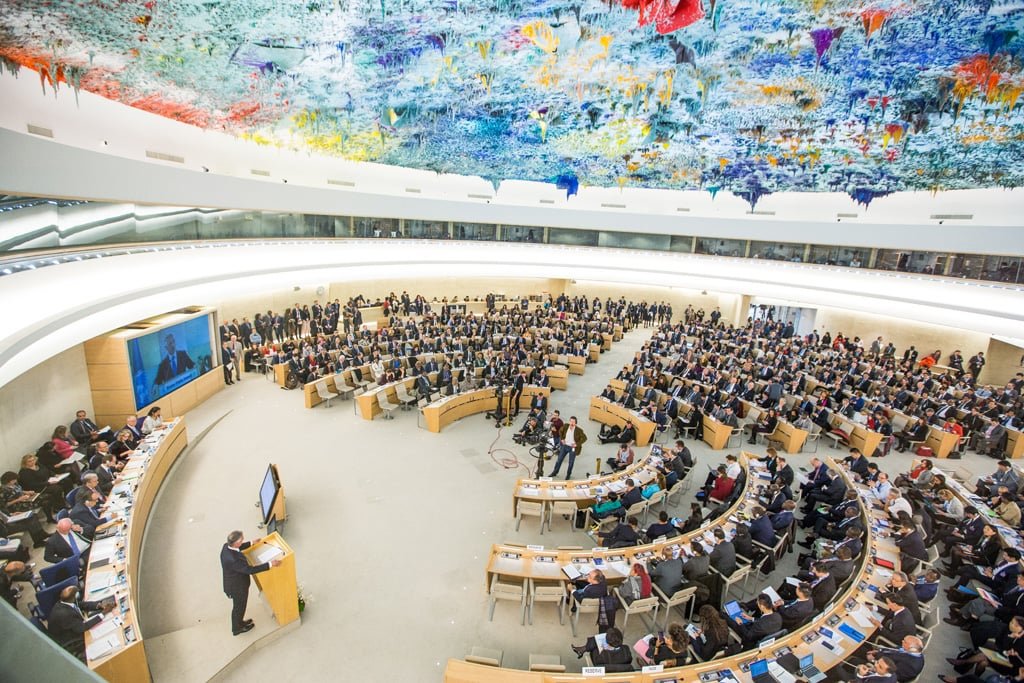Geneva, 2 March 2024 (TDI): The Human Rights Council, is a Geneva based council which is multilateral in its form and serves in the international community to discuss issues related to human rights around the globe.
It comes together to meet three times a year at the Palais des Nations in Switzerland, to delve into numerous issues such as political, civil, economic, social and cultural rights with UN officials, independent experts and investigators, Member States and civil society organizations.
HRC Functions
The Human Rights Council is based on the feature of the universal periodic review. This process involves surveying the human rights records of all 193 UN Member States once in every four years. The review is a collaborative, State driven process under the umbrella of the council.
It allows every country the opportunity to present measures taken and challenges to be met to enhance the human rights council at home and meet with their international obligations.
The Council also convenes investigative panels to examine violations in specific countries and thematic areas. An example of this could include the expert mechanism to further racial justice and equality in law enforcement.
The Council is also responsible for inspecting and monitoring violations, and in doing so appoints independent experts including Special Rapporteurs, who are also sometimes called the “eyes and ears” of the Council.
Influence of HRC
The Human Rights Council has the capacity to adopt resolutions, organize fact finding missions and investigations and establish commissions of inquiry. The Council can also appoint independent experts on matters of certain concerns.
An example of this is the appointment of the very first Special Rapporteur on the situation of human rights in Russia in 2023, and for recognizing for the very first time the right to a clean and safe environment as a human right in 2021.
These processes allow for serious violations to be emphasized and taken to the global stage for examination, discussion, and action, whenever it seems practicable.
Also Read: Qatar announces UN Human Rights Council candidacy 2025-2027
On a yearly basis, elections to the council take place by secret ballot. Countries serve over a period of three years on a rotational basis, as some seats expire on the 31st of December each year. There are 47 seats, equally allocated according to five regional divisions.
The election process of the Council is placed directly in the power of the General Assembly, which is the only UN body where each and every one of the 193 countries has equal voting influence.
The geographical group divisions and seat allocations take place to prevent unfair focus on a few regions and countries. This exercise is also observed so to ensure that every country is justly assessed.
Moreover, it is up to the Member States to choose the countries that serve through the process of elections, which contrasts with the consideration given to any one individual State’s own human rights record.
The UN General Assembly elected Albania, Brazil, Bulgaria, Burundi, China, Cote d’Ivoire, Cuba, Dominican Republic, France, Ghana, Indonesia, Japan, Kuwait, Malawi and the Netherlands, through a secret ballot on the 10th of October 2023. In addition to this, 15 newly elected States began serving their three year terms from the 1st of January.
The Human Rights Council’s 55th session opens on the 26th of February and would last until the 5th of April 2024.
The developments that are taking place include, focusing on the human rights situation in numerous countries by the High Commissioner on the 4th of March.
Also, the situation in Russia and Ukraine would be discussed as Russia has launched a military invasion on the latter country. The situation in Iran, Venezuela, Colombia and the Occupied Palestinian Territory would also be reflected upon.



